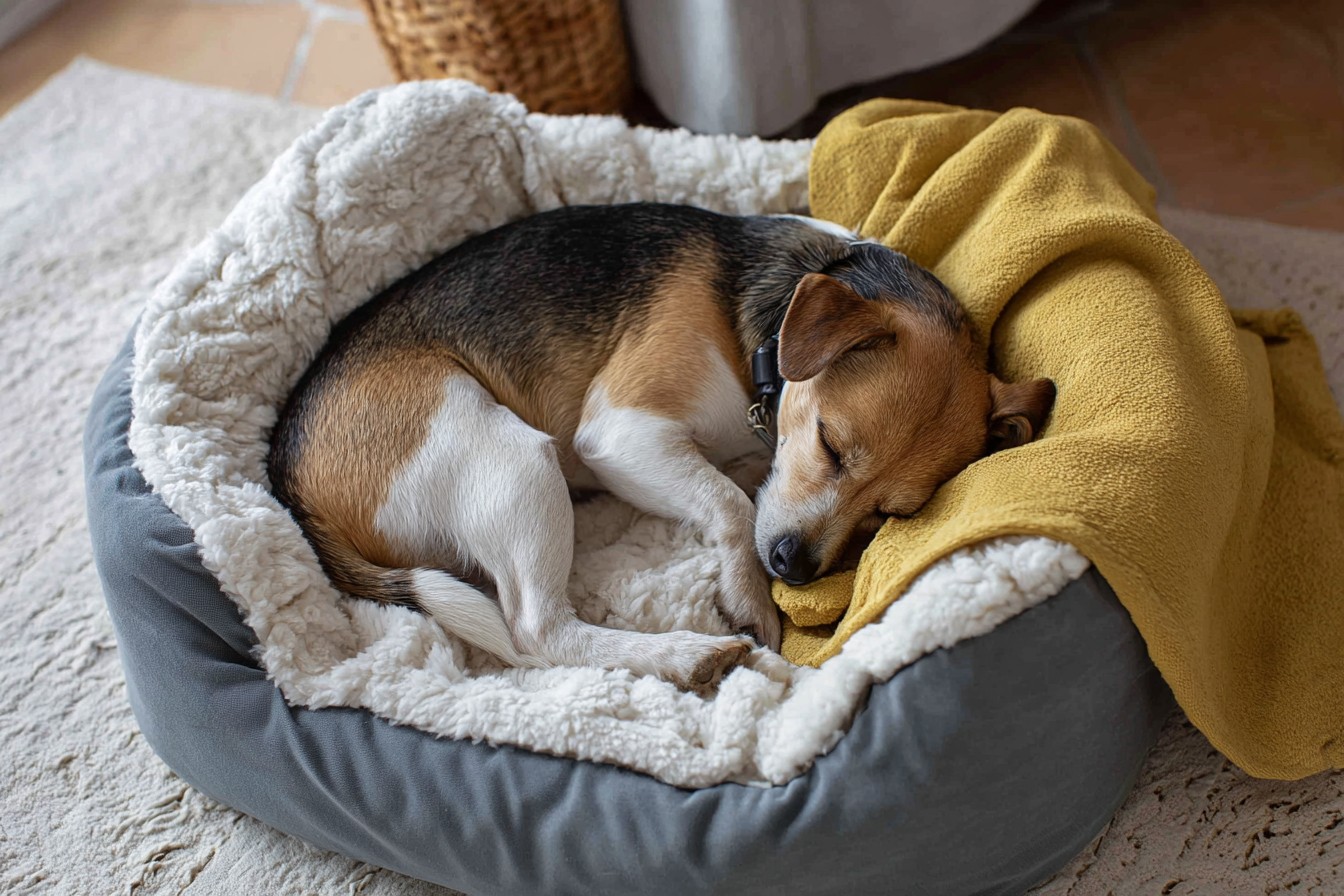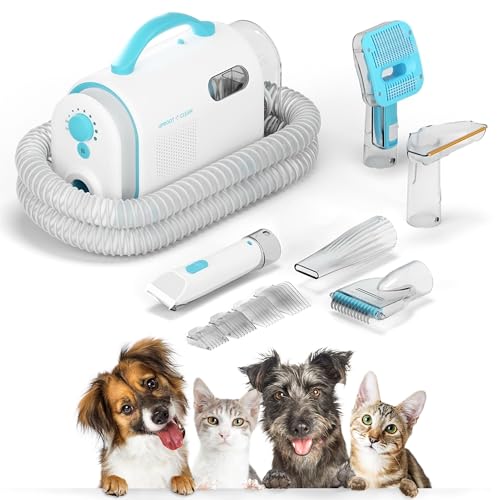Pet bedding might look clean on the surface, but it’s a magnet for fur, dander, bacteria, and odors—all of which can trigger allergies or even skin issues in both pets and people. If you’ve wondered how often should you wash pet bedding, the short answer is: probably more often than you think.
In this guide, we’ll break down expert-backed washing frequency, tips to reduce buildup between washes, and smart tools that make the entire process easier (without turning your laundry room into a second job).
🧺 TL;DR — Clean Bedding = Healthier Pets
- ✔️ Wash pet bedding at least once a week—more often if your pet sheds heavily or has allergies.
- ✔️ Use hot water & unscented detergent to kill allergens, bacteria, and pests safely.
- ✔️ Wash everything your pet sleeps on: beds, blankets, crate pads, couch throws.
- ✔️ Add the Uproot Pet Grooming Kit to reduce fur and dander between wash days.
Scroll for step-by-step tips, smart laundry hacks, and ways to keep bedding clean longer.
Minimizes allergens and pet odor buildup.
Kills bacteria and fleas effectively.
Use Uproot Kit to reduce fur at the source.
Why Clean Bedding Matters More Than You Think
Pet bedding isn’t just where your dog or cat sleeps—it’s where they shed, sweat, scratch, and snuggle. Over time, those cozy fabrics accumulate more than just fur. They become home to:
- Allergens like dander and dust mites
- Odor-causing bacteria and fungi
- Pollen, outdoor grime, and flea eggs
- Residual saliva, oils, and even urine particles
Left unwashed, this buildup can affect not only your pet’s health but also your family’s. This is especially true for:
- Households with young children
- Anyone with pet allergies or asthma
- Pets prone to skin irritation or yeast overgrowth
Even pets that seem perfectly healthy can benefit from cleaner sleeping spaces. Fresh bedding reduces the chance of infections, improves coat condition, and helps control indoor odor.
🩺 Vet Tip: Regular washing is one of the easiest ways to keep allergy flare-ups, itchy paws, and skin sensitivities under control—without reaching for medications right away.
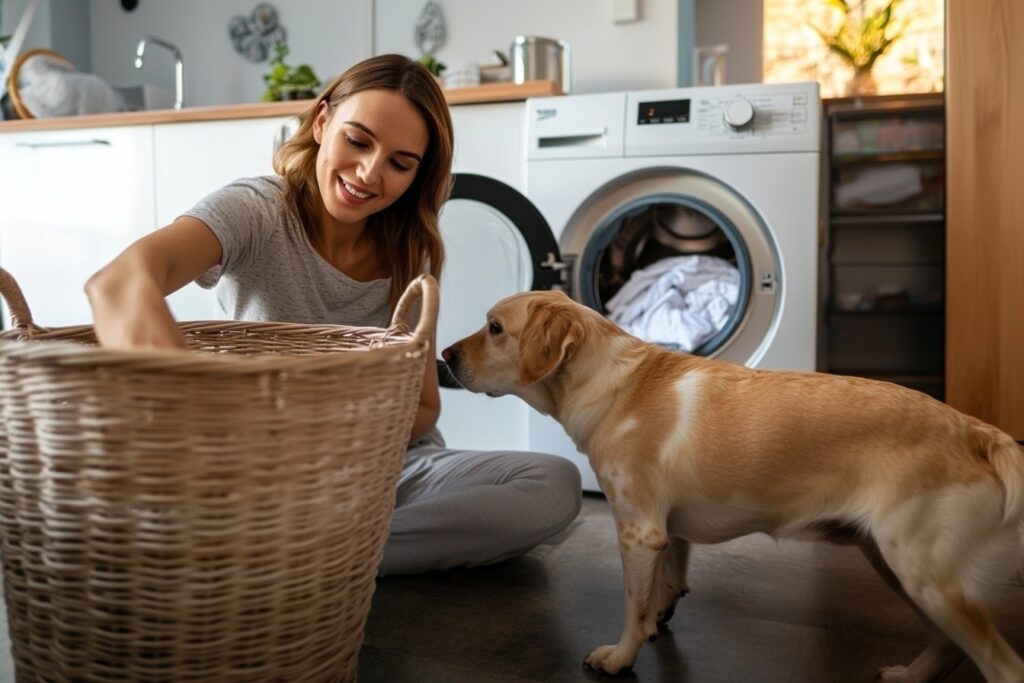
How Often Should You Wash Pet Bedding?
Let’s answer it clearly: you should wash pet bedding at least once a week. That’s the gold standard for most households—especially if your pet sheds, has allergies, or sleeps in your bed.
But here’s a quick breakdown by bedding type:
Weekly Washing Recommended For:
- Pet beds with removable covers
- Blankets or throws used by your pet
- Crate pads or liners
- Couch cushions your pet naps on
Every 2–3 Weeks (with light use):
- Lightly used carrier liners
- Spare blankets or beds in guest rooms
- Outdoor bedding stored indoors
Immediately If:
- Your pet has an accident or gets muddy
- There’s a noticeable odor or visible dirt
- Someone in the household has a pet allergy flare-up
💡 Pro Tip: If you rotate between two sets of bedding, you can wash one while the other’s in use—making weekly cleanings easier to stick with.
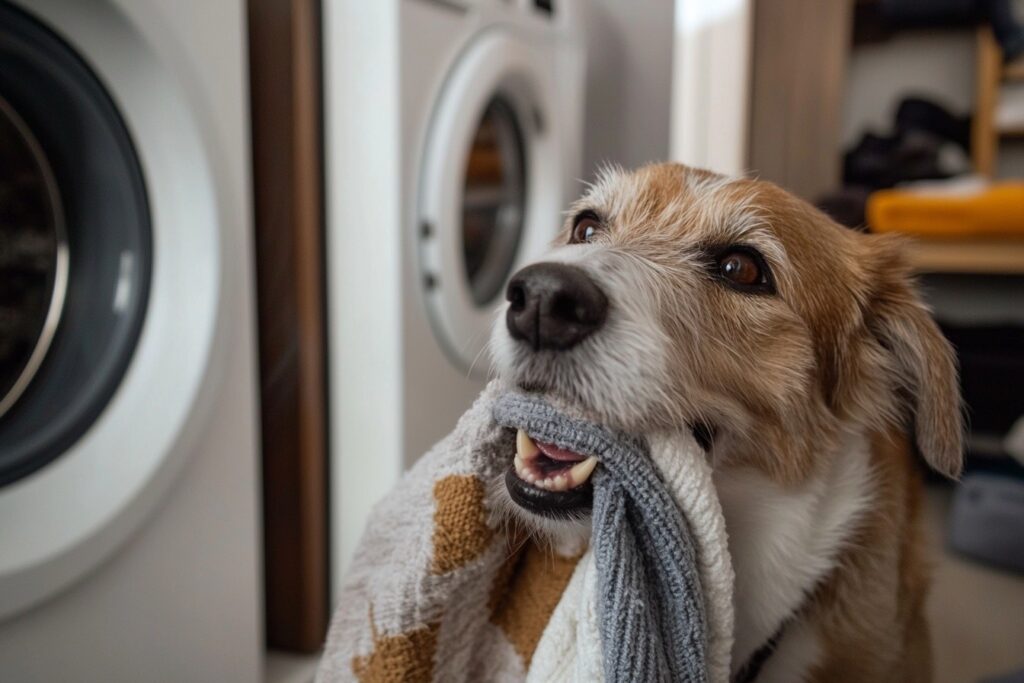
What to Wash—And How to Wash It Safely
Not all pet bedding is created equal, and how you wash it matters almost as much as how often. From thick orthopedic cushions to fleece throws, each material needs a slightly different approach to get truly clean—without falling apart.
What to Wash:
- Removable covers on pet beds
- The inner stuffing (if machine washable)
- Blankets, throws, and crate pads
- Pet-specific pillow inserts or bolsters
- Soft-sided carrier linings
⚠ Heads-up: Always check the care label first. Some inner cushions or foams require hand-washing or air drying.
How to Wash It Right:
- Use hot water (130°F+) when possible
Hot water helps eliminate bacteria, mites, and allergens—especially for bedding used by pets with skin conditions. - Choose a fragrance-free, pet-safe detergent
Avoid strong scents, which can irritate sensitive noses and skin. - Run an extra rinse cycle
This removes any lingering detergent or dander—a must for allergy-prone homes. - Dry completely
Damp padding can harbor mildew. Use low-heat tumble or air dry completely in the sun (bonus: UV rays kill germs).
💡 Pro Tip: Place smaller bedding items in a mesh laundry bag or pillowcase to prevent tearing during the wash.
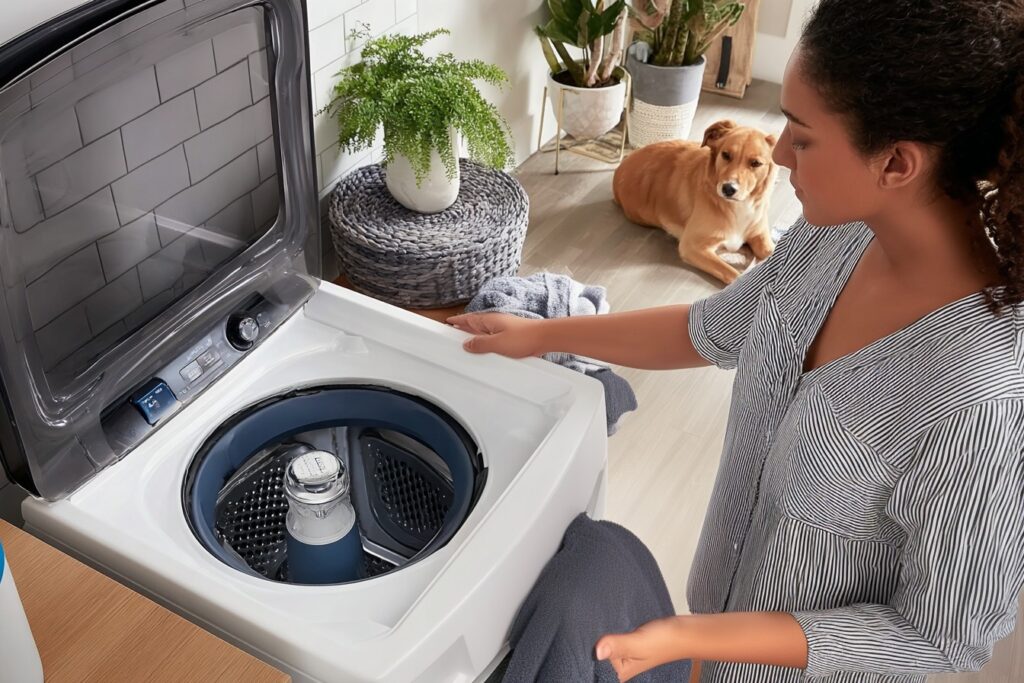
Add Prevention to Your Routine
Cleaning pet bedding weekly is a strong defense—but combining it with fur prevention and machine maintenance turns it into a complete system for hygiene and comfort.
Here’s how to level up:
Groom Before You Wash
One of the smartest ways to reduce how often you need to wash pet bedding? Catch the fur before it falls.
The Uproot Pet Grooming Kit (7-in-1) is a mess-free, all-in-one system that lets you:
- Deshed your dog or cat with minimal cleanup
- Collect loose fur in a reusable chamber
- Use different attachments for short or long hair
- Keep shedding under control before it hits your floors and bedding
💡 Bonus: Regular brushing not only helps with cleanliness—it supports healthy skin, reduces matting, and cuts down on allergens.
Check out our review of the Uproot Clean 7-in-1 Grooming Kit on TechnoBark for more details.
Keep pet grooming mess-free with this ultra-quiet vacuum, designed to capture 99.9% of hair and debris while you groom. With 7 attachments, you can brush, trim, detangle, and even dry your pet with ease. Thanks to SilentGroom Tech, it runs at a comfortable 52 dB—much quieter than standard vacuums. Plus, it’s reusable and easy to maintain; simply empty the container and continue grooming without hassle.
Don’t Forget the Washing Machine
Even if your washer is loaded with features, it’s not immune to pet hair buildup, soap scum, or odor-causing gunk. Enter the Uproot Washing Machine Cleaner Pro.
This once-a-month cleaner helps you:
- Dissolve trapped fur, grime, and detergent residue
- Eliminate foul odors caused by pet messes
- Extend the life of your washer
- Keep cycles efficient and hygienic
It’s septic-safe, compatible with all machines (including HE), and simple to use—just drop it in and run a hot cycle.
⚠ Reminder: A clean machine means cleaner bedding and fewer allergens recycled through your wash loads.
Smart Laundry Hacks for Pet Bedding
Even with a good routine in place, smart laundry strategies can take your wash results from clean to truly fresh. These tips work especially well when you’re dealing with fur-heavy loads, odors, or bulky bedding materials.
Pre-Treat With a Dryer Tumble
Before washing, toss blankets or beds (with removable covers) into the dryer for 5–10 minutes with wool dryer balls. This loosens embedded hair and makes it easier for the washer to do its job.
Use Multiple Rinses
Most smart washers like LG, Samsung, and Whirlpool allow you to add an extra rinse cycle—essential for rinsing out fur, allergens, and detergent residue thoroughly.
Create “Pet-Only” Cycles
If your washer lets you save custom settings (like Maytag’s Deep Fill or Whirlpool’s Pet Pro), create a dedicated pet load with added rinses, high spin, and warm water. This prevents fur from sticking to your human laundry.
Don’t Skip the Self-Clean
Program your washer to run a self-clean cycle monthly—especially if you’re washing beds and blankets regularly.
💡 Pro Tip: When in doubt, go big on drum size. A larger drum gives pet bedding more room to move, meaning more fur gets dislodged instead of ground in.
Bonus: Look for Washable Pet Beds
No matter how diligent you are with laundry, some pet beds are just harder to clean than others. If you’re tired of wrestling with oversized foam or beds that trap odors, it might be time to upgrade.
What to Look For:
- Removable, machine-washable covers
- Durable stitching that can handle repeated washes
- Water-resistant liners to block urine and drool
- Quick-dry or breathable fabrics
💡Pro Tip: Choose neutral-colored or patterned covers to help hide everyday fur between washes—bonus if the brand offers replacement covers.
If you’ve already invested in washable options from brands like Bedsure or PetFusion, keep a second cover on hand so your pet isn’t without a bed during laundry day.
Final Thoughts: Clean Bedding, Healthier Home
Washing your pet’s bedding regularly isn’t just about odor control—it’s about creating a healthier environment for your pet and your family. From reducing allergens and bacteria to preventing fleas and skin issues, clean bedding is a small habit with big impact.
By combining weekly washes with preventative tools like the Uproot Grooming Kit and maintaining your washer with the Uproot Washing Machine Cleaner Pro, you’ll reduce the mess—and the stress—of pet life.
Clean bedding = better sleep for your pet, fewer sniffles for your household, and a home that smells and feels fresher every day.
Author
-
Hey there, I'm Jamey, and I've been an animal lover for as long as I can remember. Growing up on a 50-acre farm in Ontario, Canada, I was surrounded by a menagerie of furry friends, from beloved cats and dogs to goats, horses, cows, and even chickens. Now, I call Victoria, British Columbia my home, and my heart belongs to my adorable Balinese cat, Milo. When I'm not editing blog posts, I enjoy helping solo entrepreneurs with their passion projects and online marketing. Over the years, I've also ventured into creating and selling various blogs.

